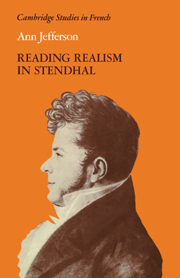Book contents
- Frontmatter
- Contents
- Preface
- PART ONE Introduction
- PART TWO De l'Amour
- PART THREE Le Rouge et le Noir
- PART FOUR Vie de Henry Brulard
- PART FIVE La Chartreuse de Parme
- 7 The representation of politics and the politics of representation
- 8 A hero without qualities
- 9 Forgery, plagiarism and the operatic text
- Conclusion
- Notes
- Bibliography
- Index
- Cambridge Studies in French
7 - The representation of politics and the politics of representation
Published online by Cambridge University Press: 05 February 2012
- Frontmatter
- Contents
- Preface
- PART ONE Introduction
- PART TWO De l'Amour
- PART THREE Le Rouge et le Noir
- PART FOUR Vie de Henry Brulard
- PART FIVE La Chartreuse de Parme
- 7 The representation of politics and the politics of representation
- 8 A hero without qualities
- 9 Forgery, plagiarism and the operatic text
- Conclusion
- Notes
- Bibliography
- Index
- Cambridge Studies in French
Summary
La politique corrompt toujours la beauté; c'est que la politique veut agir sur le plus grand nombre.
Stendhal, JournalLe discours politique n'est pas le seul à se répéter, et à se généralises à sefatiguer.
Barthes, Roland BarthesPolitics and/in literature
The pistol shot of politics that rings out in each of Stendhal's novels is regularly described in them as a gross impropriety which detracts from the harmonies of the novel's central imaginative concerns, but which the demands of accurate representation unfortunately make a necessary component of the fiction. The mirror principle imposes its exacting requirements, and the reluctant novelist must comply. In Armance it is a precise and dutiful historian who finds himself professionally obliged to record a conversation between Octave and Armance which happens to touch on political issues:
Ce n'est pas sans danger que nous aurons été historiens fidèles. La politique venant couper un récit aussi simple, peut faire l'effet d'un coup de pistolet au milieu d'un concert.
(Armance, p. 105, my italics)In Le Rouge the apology appears as a parenthetical comment in the account of the royalist conspiracy which Julien is brought in to memorise. Here the author emphatically opposes politics to the passionate and energetic interests of the imagination, and it is his publisher who reprimands him sharply with a reminder of his obligations to the mirror principle:
– La politique, reprend l'auteur, est une pierre attachée au cou de la littérature, et qui, en moins de six mois, la submerge. La politique au milieu des intérêts d'imagination, c'est un coup de pistolet au milieu d'un concert. Ce bruit est déchirant sans être énergique. Il ne s'accorde avec le son d'aucun instrument. […]
- Type
- Chapter
- Information
- Reading Realism in Stendhal , pp. 155 - 180Publisher: Cambridge University PressPrint publication year: 1988

